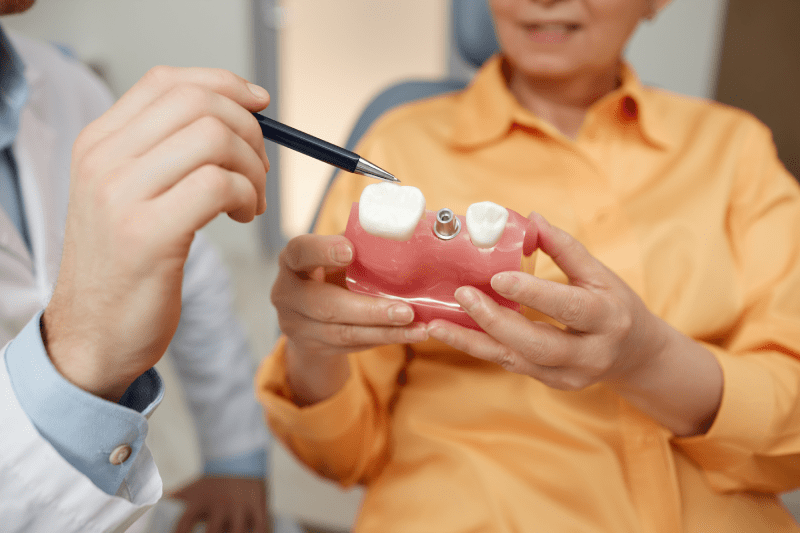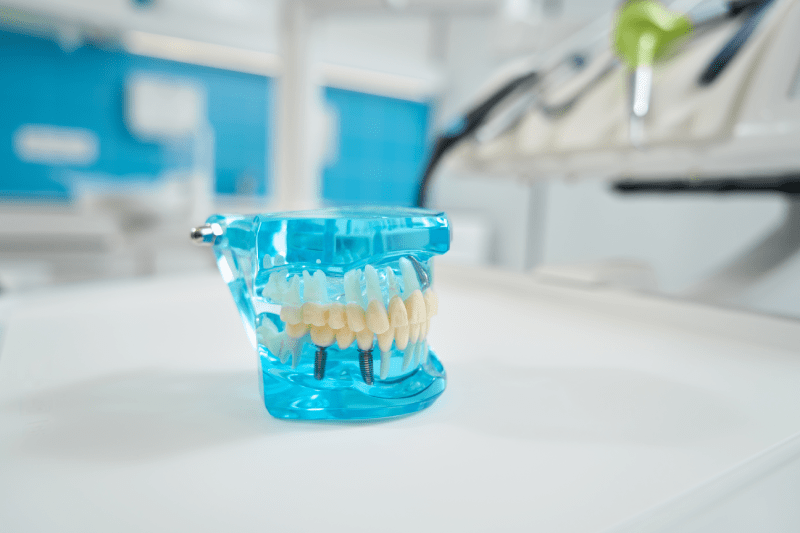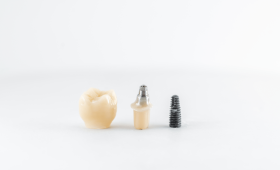Dental Crowns vs. Implants: Which One Should I Choose?: Frequently Asked Questions
For missing, damaged, or decayed teeth, two of the most common solutions are dental crowns and implants. While both offer aesthetic and functional improvements, they have significant differences in their purpose, methods, and long-term outcomes. This content addresses these fundamental differences, similarities, advantages, and disadvantages through 35 of the most frequently asked questions. To find out which method is best for you and to create a personalized treatment plan, you can contact Cure Holiday.
What Is the Main Difference Between a Dental Implant and a Dental Crown?
A dental implant is a more comprehensive treatment that rebuilds the entire tooth, including both the root and the crown. An implant is an artificial titanium screw placed into the jawbone that serves as the new tooth’s root. A dental crown, on the other hand, is a prosthesis placed over a damaged or weakened tooth with a healthy root, covering it completely like a cap. The main difference is that an implant replaces a missing tooth from the root, while a crown preserves and strengthens an existing tooth.
In What Situations Should a Dental Implant Be Preferred?
A dental implant is the best option for replacing entirely missing teeth. It is also used to replace teeth that need to be extracted due to decay, a fracture, or trauma. An implant fills the gap without harming adjacent teeth, prevents jawbone loss, and provides natural chewing function. This is the most permanent and functional solution for long-term oral health.

In What Situations Should a Dental Crown Be Preferred?
A dental crown is ideal for repairing and protecting a tooth with a healthy root that is severely decayed, fractured, or weakened by large fillings. It is also used to prevent teeth that have undergone root canal treatment from cracking. Crowns restore the tooth’s original shape, size, and strength, protecting it from further damage.
What Is The Lifespan of a Dental Implant?
With proper care and regular dental checkups, a dental implant is expected to last a lifetime. The implant itself integrates with the jawbone, serving as a permanent root. However, the prosthesis or crown placed on top of the implant may need to be replaced after 10 to 15 years, depending on oral hygiene and chewing habits.
What Is The Lifespan of a Dental Crown?
The lifespan of a dental crown varies depending on the material used and oral hygiene. A dental crown typically lasts 10 to 15 years. Metal-supported crowns may be more durable, while zirconia or porcelain crowns are aesthetically superior. The natural tooth underneath the crown can still decay, or the crown itself might crack, necessitating its replacement.
Which Is More Affordable in Terms of Cost?
Initially, dental crowns are more economical than implants. This is because a crown only covers the top part of the tooth and does not require surgery. Dental implants have a higher cost due to the surgical procedure, implant materials, and the crown placed on top. However, since implants offer a more permanent and healthy long-term solution, they may be more cost-effective in the long run.
How Do Dental Implants Benefit Jawbone Health?
Tooth loss causes the jawbone to deteriorate over time. When dental implants are placed in the jawbone, they function like a natural tooth root and stimulate the bone, preserving bone density. This helps maintain the facial structure and prevents adjacent teeth from shifting. Dental crowns do not provide this benefit.
Which Procedure Requires More Surgical Intervention?
A dental implant is a surgical procedure that requires placing a titanium screw into the jawbone. This is done under local anesthesia. A dental crown is a less invasive procedure that involves minimal filing of the tooth’s enamel layer.
What Are the Advantages of Both Treatments?
The advantages of dental crowns are that they preserve the natural tooth root, are completed in a shorter time, and are more affordable. The advantages of dental implants are their lifelong durability, jawbone preservation, no damage to adjacent teeth, and a natural feel.
What Are the Disadvantages of Both Treatments?
The disadvantages of dental crowns are the risk of decay in the tooth underneath, the need for bridges that can harm adjacent teeth, and their inability to prevent jawbone loss. The disadvantages of dental implants are their higher cost, the need for surgery, and a longer healing period.
Is Implant Treatment Painful?
Thanks to the local anesthesia applied during implant treatment, no pain is felt. Any mild pain and swelling after the operation can be easily managed with pain relievers recommended by your doctor. Patients often say this process is more comfortable than a tooth extraction.
Which Treatment Provides Faster Results?
Dental crowns generally provide faster results, as they are completed in two or three appointments. For implant treatment, a waiting period of 3 to 6 months is required after the surgical procedure for bone fusion (osseointegration). Therefore, crowns are a faster solution.
Can a Crown and an Implant Be Used Together?
Yes, dental crowns and implants can be used together in dental treatment. For example, after an implant is placed in the jawbone, the final restoration placed on top is called a crown. Thus, the implant serves as the root of the missing tooth, and the crown completes the visible part.
Which Treatment Is Used When There Are No Teeth in the Mouth?
When there are no teeth in the mouth, implant-supported denture systems like All-on-4 or All-on-6 are the best solution. In these treatments, four or six implants are placed in each jaw to support a fixed bridge prosthesis that holds all the teeth. This gives the patient fixed and functional teeth.
What Materials Are Dental Crowns Made Of?
Dental crowns are made from various materials depending on aesthetic, durability, and cost factors. The most popular materials are porcelain-fused-to-metal, zirconia, and all-porcelain (E-max) crowns. Zirconia and E-max crowns, which do not contain metal, provide a more natural and aesthetic appearance.
What Materials Are Used for Implants?
Implants are usually made of titanium or zirconia. Titanium is a material that has been used for many years due to its biocompatibility and durability. Zirconia is a good alternative for those with metal allergies or those seeking a more aesthetic appearance.
Which Treatment Makes Oral Hygiene Easier?
The care for implant-supported teeth is the same as for natural teeth. They are easily cleaned with brushing and flossing, which makes oral hygiene easier. The care for crowns is similar, but more attention is needed due to the risk of decay in the natural tooth underneath the crown.
How Does Smoking Affect the Treatment?
Smoking negatively affects the success of both treatments. It slows down wound healing, increases the risk of infection, and makes it difficult for the implant to integrate with the bone. It is very important to quit or reduce smoking for a successful treatment.
How Long Does Implant Treatment Take to Complete?
The duration of implant treatment includes the period from implant placement to the fitting of the permanent tooth. This process is longer due to the 3 to 6-month waiting period required for the implant to fuse with the bone. Crown treatment is usually completed within one or two weeks.
Why Are Implants More Advantageous Than Bridges?
Implants replace a missing tooth without touching adjacent teeth, while a bridge requires the filing down of the healthy teeth on both sides of the missing tooth. An implant preserves the jawbone, while a bridge does not, and the bone underneath continues to deteriorate.
How Do Dental Crowns Prevent Tooth Loss?
Crowns help prevent tooth loss by preserving the integrity of a damaged tooth and stopping cracks from growing. They protect the tooth from external factors, extending its life and preventing situations that would require extraction.
Which Treatment Provides a More Natural Appearance?
Both dental crowns and implant-supported prostheses are custom-designed to match the shape, size, and color of the teeth, providing a natural appearance. However, since implants function like a natural tooth root, they offer a more natural experience in terms of overall structure and feel.
Are Teeth Filed Down for Dental Crowns?
Yes, for a dental crown to fit properly, the enamel layer around the tooth is filed down to reduce its size. This process allows the crown to fit snugly on the tooth and achieve a natural appearance. The amount of filing depends on the type of crown and the existing condition of the tooth.
Who Is a Suitable Candidate for an Implant?
Suitable candidates for an implant are those with healthy gums, sufficient jawbone volume, and good overall health. Your dentist will evaluate your bone density with radiographic examinations to determine if you are a suitable candidate for an implant.
Who Is a Suitable Candidate for a Dental Crown?
Suitable candidates for a dental crown are those with healthy roots but with teeth that have a compromised appearance, shape, or strength. A crown can be the best solution if a tooth needs a large filling or is at risk of fracturing.
Which Treatment Restores Chewing Function Better?
Because implants are securely fixed to the jawbone, they restore chewing function in a way that is most similar to natural teeth. Dental crowns also improve chewing function, but this depends on the strength of the natural tooth root on which the crown is based.
Why Is Choosing an Implant Brand Important?
The choice of implant brand directly affects the long-term success and reliability of the treatment. Globally recognized and clinically proven brands use high-quality materials and surface technologies to maximize implant fusion with the bone. This reduces the risk of potential complications.
What Should Be Considered When Choosing a Dental Crown?
When choosing a dental crown, you should consider the type of material (zirconia, porcelain, metal-supported, etc.), the dentist’s experience, and the aesthetic features of the crown. For front teeth, metal-free crowns with a natural appearance should be preferred.
In Which Situation Are Both Treatments Unnecessary?
If your teeth have only minor aesthetic flaws (slight discoloration or small cracks), more conservative and affordable treatments like laminate veneers or bonding may be preferred. These treatments involve less intervention in the natural tooth structure.
Which Treatment Should Be Chosen in Case of Gum Recession?
If gum recession is a serious issue, it must be treated first. After that, treatments like implants or crowns can be applied. In patients with gum recession, metal-supported crowns can cause an unaesthetic dark line, while zirconia or porcelain crowns offer a more natural appearance.

Can Dentures Be Used Instead of Implants?
Dentures are a temporary and removable solution for missing teeth. Implants, on the other hand, are a fixed, permanent, and functional solution that acts like a natural tooth. While dentures cannot stop bone loss, implants prevent it. Implants are much more comfortable and secure than dentures.
What Are the Differences Between Implant and Crown Treatments?
- Purpose: An implant replaces a missing tooth, a crown repairs a damaged tooth.
- Application: An implant is a surgical procedure, a crown is less invasive.
- Durability: An implant can be permanent for life, a crown has a shorter lifespan.
- Root: An implant provides an artificial root, a crown uses the natural root.
How to Decide for the Best Result?
You can make the most accurate decision after a detailed examination and diagnosis by a dentist, considering the current condition of your teeth, your general health, your budget, and your aesthetic expectations.
To determine the most suitable treatment method for you and to create a personalized treatment plan, contact Cure Holiday.



